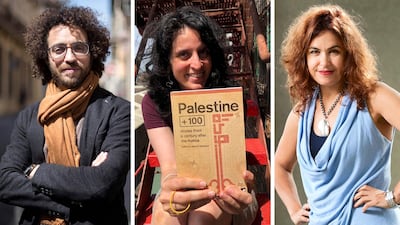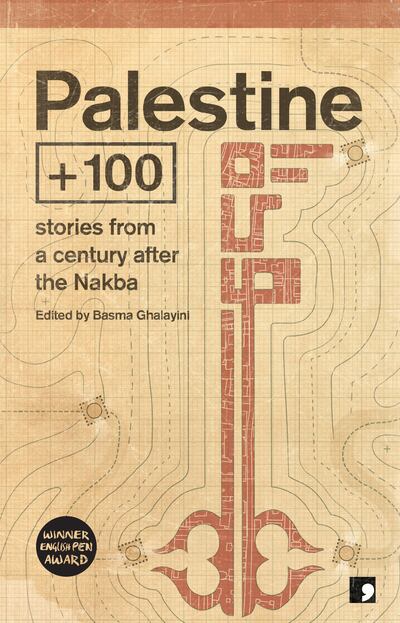It's June 15, 2048, and a high-speed, underground shuttle is about to be launched, carrying goods from Gaza to neighbouring affiliated countries, in exchange for much-needed materials. Paid for by a cryptocurrency, it's the brainchild of Professor Kamal, who lives in The Secular Scientific Enclave and is the creator of Body-Bots – a semi-indestructible fighting force who have triggered severe bombardments. Welcome to Selma Dabbagh's scarily plausible future Gaza, a future just 29 years away.
Dabbagh's inventive short story, Sleep it Off, Dr Schott, is typical of the 12 entries in Palestine+100, a fascinating anthology of commissioned work that imagines what Palestine might look like a century on from the Nakba of 1948, which displaced 700,000 people from their homes. What's particularly interesting, is that science fiction is not something Palestinian writers are particularly familiar with, and most of the featured writers have never previously attempted the genre.
And there's a complex reason for that. Dabbagh thinks Palestinian writers have always felt a kind of duty to explain their strong moral and legal arguments to the international community.
“That means writing about anything other than the current situation, the need for change or the underlying political narratives has been seen as a luxury, a betrayal, even, from what you should be doing as a Palestinian author,” she says.
But Dabbagh, who has felt constrained by that expectation in the past, says that even the criticism of writers who are exploring science fiction or domestic dramas suggests there is more nuanced thinking these days. Certainly Palestine+100's editor, Basma Ghalayini, loved the varied submissions she received after taking on the commission to mirror a similar Comma Press project from three years ago, Iraq+100.
"I do agree with Selma that science fiction doesn't come naturally to Palestinian writers – we're a serious and politicised people who find it difficult to look outside our reality and venture into other genres and worlds," she says. "But I told the writers to read George Orwell's 1984, and to watch Neill Blomkamp's film District 9. And I think what they found is that science fiction is a really good way to navigate memories, to have a free space to write what they want and, in some cases, project a version of themselves forward in time."
Still, it was a long, involved process for some. Mazen Mahrouf was so daunted, he'd actually written an email to Ghalayini to say he couldn't finish his story. This is the man who was longlisted for this year's Man Booker International Prize for his short story collection, Jokes for the Gunmen. But something about the idea of being "The Last Palestinian" drew him back, and The Curse of the Mud Ball Kid – an adept, fresh look at the psychological impact of the occupation – is the result.
Mahrouf says science fiction has helped him explore a side of his Palestinian identity he'd previously felt lacking, as someone who was born in Beirut to Palestinian parents and now lives in Reykjavik. "Science fiction saved my face from my exposed ignorance about Palestinian society," he jokes. He's being modest, but The Curse of the Mud Ball Kid is also perhaps the bleakest story in a collection that features Palestinian superheroes, parallel worlds and drone swarms from the likes of Saleem Haddad, Ahmed Masoud and Anwar Hamed.
“My feelings are very negative because of the devastation of Palestinian society at home,” says Mahrouf. “It’s fractured into communities, identities and affiliations, and we have two governments that are isolated from each other and hostile to one another. We have to admit this courageously.”
Dabbagh understands why some of Palestine+100's stories are so dark, though. For her, it's because the political horizon is bleak. Nevertheless, she prefers to believe in hope, and there's certainly a kernel of it in Sleep it Off, Dr Schott's idea that Gaza can connect itself to countries outside its immediate borders. "For me, there is the possibility of something better for Palestine – and if you can't see, believe or work for it then it's never going to happen," she says. "There always needs to be new ideas that can be latched on to, that people can coalesce around. So hope can come from writers and science fiction, without the stories becoming too whimsical or propagandist."
Ghalayini prefers to suggest there’s a hard-won realism in these futuristic stories; Palestinians and Israelis are often living side by side, but not together. But that’s not the only lasting impression she gets from stories she’s lived with for a while now; for her, there’s a sense that these writers – in fact any Palestinian writer – can record and explore memories, events and feelings that are otherwise lost in the ether.
“Gaza and the West Bank are occupied, but you don’t often see soldiers walking around,” she says. “It’s interesting that these 12 stories often explore a big implied presence rather than confrontations or altercations; the face of the enemy isn’t seen.
"So when Palestinians write fiction – of whatever genre – we are making sure we keep a strong memory of the time since Nakba, and keep it alive. Because no one else will."


